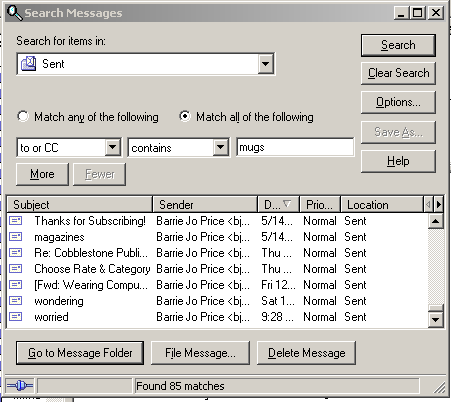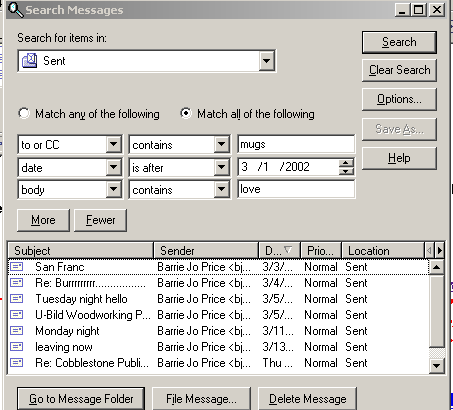emTech
Consulting Basic Computer Tools
Modules 
emTech
Consulting Basic Computer Tools
Modules 
BACKGROUND on this
topic
Increasingly
teachers are considering having students turn in their assignments via
email. Even with small numbers, there are some things that will make
this work more smoothly for both teachers and students. Those working in
Virtual High Schools can attest to how important it is to have things fairly
well organized before beginning to use student email submissions!
These tips have resulted from work with teachers in inservice situations as well as with our own online experiences with asynchronous courses. Obviously, as the email programs, student skills and sophistication of our own applications change, this list of 'tips' will change. At the bottom, we invite you to send us your own 'tips' for inclusion in this page.
TIP
#1: Assignment Mailboxes
If
you are going to have students turn in assignments on email, be sure to
set up a special assignment mailbox. If you have multiple sections or courses,
you may even want to have one for each section or course. For example,
one of us teaches multiple sections of the same course, so we have a separate
mailbox for each section. The mailboxes might be: 10001@emTech.net
and 10002@emTech.net. Another of us has multiple courses, so the
mailboxes might be, for example, hist303@emTech.net and civics200@emTech.net.
This way you can keep the assignments separate for each section or for
each course. These mailboxes are ONLY for turning in assignments,
not for questions, comments, etc. Those need to go to another mailbox
or your professional mailbox.
TIP
#2: Questions Mailboxes
We
recommend that you set up a mailbox for questions related to the course,
separate from your personal email or be sure that the students only use
your school account or something. Some of us like to have four kinds
of accounts: 1) assignment mailboxes as described above, 2) personal email
for non-school related communications, 3) school mailbox for professional
communications, and 4) questions mailbox where students can send their
questions, comments, etc. Some faculty do not have this last one,
but they do tell the students NOT to send questions to the assignment mailboxes.
It's important to keep the questions coming into some mailbox that you
check most regularly; you may or may not open the assignment mailboxes
daily. This way, if a student is in a panic, he/she has a better
chance of reaching you with the questions or concern.
TIP
#3: Subject Line
Give
specific instructions as to what goes into the subject line on each assignment
coming in by email. Here's what we use in our courses:
In the example above, included in EVERY assignment instructions, it tells the student PRECISELY what to put in the subject line. This is critical. Then, either by hand or using a filter (depending on your email program), you can sort the assignments and search more easily to find assignments.
Notice, too, that for attached files, give them the precise way that you want them to name the files. This makes it easier for you to save the files and keep up with them in your own documents.
TIP
#4: Filing the Assignments
Keep
your assignments separate within each mailbox. You can keep them
in folders by assignment (i.e. topic 1, topic 2, etc) or by student (Jane
Doe, John Doe, etc). Always keep your assignment mailboxes filed
so you can easily retrieve them. That's why it is important that
you set up a procedure for what goes in the SUBJECT LINE for each assignment.
If you have students attach WORD documents and such, be sure to set up a directory or directories that correspond with the assignments so that, as you open the documents attached, you can file them in an appropriate directory. That way all of assignment 3 documents are filed under assignment 3 directory. Then, when there are questions or you are looking for examples for good work for next year's group, this makes it easier.
TIP
#5: Student Email Accounts
It
is much easier to manage email assignments if all of your students use
the same type of email account. For example, in our classes at The University
of Alabama, we ask all students to use their bama mail accounts to send
in questions and assignments.
This is somewhat important, especially if you have large numbers of students. If you have to 'trouble shoot' why they can't send a file or open a file, it's easier to only have to learn how to do this in one email package. If you have students using yahoo, hotmail, etc., then this is more complicated and each package may handle tasks differently.
However, IF your students do have personal accounts that include AOL, etc., then you MAY way to get your own account in each of those systems, so you can learn how they do it in that system. For example, you would see how they attach files in each program, if it is different.
TIP
#6: Educate the Students
If
you are going to have students turn in work electronically, then be sure
to take time to 'instruct' them in precisely how you want that done. Show
the the mailbox addresses, explain how why the subject line is important,
and be sure to send back any initial work that does not have the proper
subject line information. This underscores the importance of this
requirement.
Begin with something like having each student write, in WORD, a couple of paragraphs about themselves. Have them send it as a WORD attachment FOR POINTS. This gives you a chance to help them learn the process before you get into the content itself of your course.
TIP
#7: Learn How to Search Your Email
Learn
how to search your email using specific tools. Here's an example
of some searches; your email package may work differently, so be sure you
know how to use the package you have.
Search A: This is a search of the INBOX for emails sent by someone named 'mugs'. I can add another variable to the search, such as date.
Search B: Here's a search of the SENT file; the search is showing a search of the SENT mail for all emails sent to someone with 'mugs' in the name/email:
Being able to search your INBOX, SENT and all folders is critical to effective email management. Be sure you know how to use the search function in your own email package before you get too far into electronic collection of assignments for your students.
The search can be refined to show, for example, all SENT emails to this person since March 1, 2002. Here's that search:

This is the list of emails that fit the search factors listed above.
SEND US YOUR TIP: Send it to bjprice@emTech.net.
emTech
Consulting Basic Computer Tools
Modules
emTech Consulting
Copyright © 2002 Barrie Jo Price, George E.
Marsh II, and Anna C. McFadden
All Rights Reserved